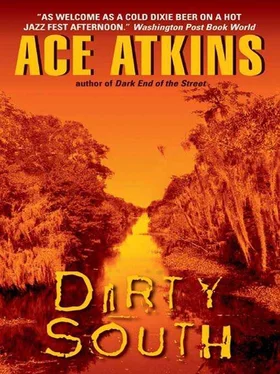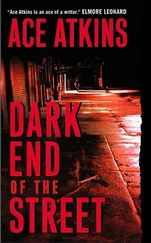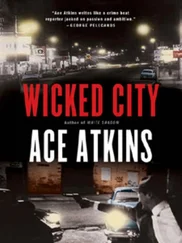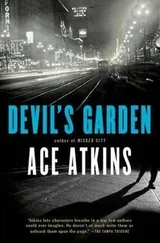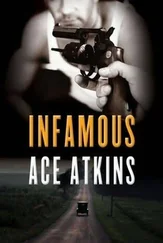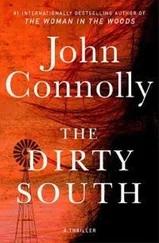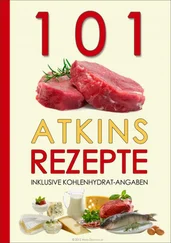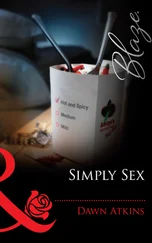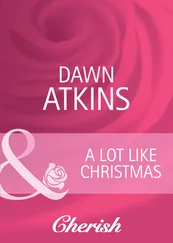I explained Teddy’s situation, leaving out the worrisome details.
“Well, I’d already gotten the horses into the trailer and was waiting like a dumb-ass for you to roll down the road,” she said. “Why do you do things like this?”
“He needed help in a bad way.”
“I knew you’d do this to me.”
“Maggie, I swear to you, it’s not that,” I said. “I swear.”
“Well, tomorrow’s your birthday,” she said. “You can fuck it up any way you want.”
I’d forgotten.
“I’ll be there tomorrow,” I said. “I promise.”
I heard her son Dylan talking to her in the background. She said something short to him and then said to me, “I’ve got to go.”
Dial tone.
Annie barked.
I poured out some dog food and scratched her ears. “You like me. Right?”
I PARKED beneath the expressway leading up to the Greater New Orleans Bridge about thirty minutes later. Above what felt like a concrete cave with a ceiling of twisting on-ramps, cars and trucks made roaring sounds. I passed by thick columns spray-painted with graffiti and elevation markers and smelled the exhaust. Crime-scene tape marked the set. The light had faded into that summer afternoon golden glow and softened all the asphalt and concrete. The sun touched everything as it grew weak and I sat watching it fade for a few minutes, aware that I was just getting started with my day.
I saw Teddy talking to a skinny black man wearing a Metairie Zephyrs baseball hat backward and a satin Yankees jacket. The man watched a video monitor and pointed to a loose group of dancers surrounding ALIAS. The kid was breathing hard and soaked with sweat in a circle of 1960s American cars with low-rider shocks to make them jump up. About forty women in bikinis, all hard-bodied and sweating, and about fifty or so thugs stood ready to go wild when ALIAS pointed to them. They were at his command and every few minutes he’d flash a gold smile and point to the center of the group just to hear them scream.
During the break, I yelled for Teddy, who gave me the one-minute gesture. Thumping bounce rap music thudded from some speakers near ALIAS and he started into a rolling rap about Reebok sneakers, FUBU shoes, and a whole lotta Cristal was gonna make it real smooth. He bragged about a Mercedes-Benz and two Escalades and how the women who kept his company just couldn’t behave.
He had a roughened, musical voice and worked his tricky lyrics and rhymes as if he were juggling words and verses in midair.
I didn’t know rap but I knew he was good.
“Hey, dog,” Teddy yelled. He wore rimless sunglasses tinted a deep red and a toothpick hung out of his mouth. The rap music was loud and shaking and the red, green, and yellow cars bucked like wild horses, the bikini girls popped their asses, and the posse just shouted and waved black-and-gold bandannas over their heads.
We walked to a far corner of the expressway cavern, behind one of the huge columns, where we were somewhat shielded from the music.
“I know about the cops and Malcolm,” I said.
He was silent.
“You could’ve just dropped a word, man,” I said. “I like to know these things.”
Teddy was six feet six and 300 pounds and loomed over me while I talked. Not a lot of people made me feel so small.
“The cops wanted Malcolm ’cause it was easy,” Teddy said, finally speaking.
The rain from earlier dripped down in dirty beads from underneath the expressway and dropped onto Teddy’s sunglasses. He wiped his face and looked over my shoulder.
“Why won’t he let them see his bank account?”
The music stopped and I heard the director yelling at one of the women to put her bikini top back on. While Teddy and I watched, a young white man in loose khakis and a plaid untucked shirt came by.
“I need to talk to Malcolm,” I said.
Teddy nodded and said, “Later.”
The man offered his hand to me and I shook it.
“This your friend Nick?” the man asked. He was in his late twenties. Easy smile on his face. Relaxed handshake. His eyes kind of unfocused, slow and lazy in his movements. He looked like he’d just woken up and stifled a yawn with his fist.
“This my dog Trey,” Teddy said. “Take care of my financial things. Keep the Ninth Ward show runnin’ hard.”
“Y’all work together?” I asked.
“Trey Brill,” he said. He had that carefully disheveled hair that was supposed to make you look like you’d just crawled out of bed. He was kind of tan and had a slight blondish stubble on his face. He kept his sunglasses on Croakies around his neck.
“Thought I was your one and only token,” I said.
“I like to diversify.”
“Hey, man,” I said to Trey. “I need to talk to you for a few minutes.”
“You can come by the office tomorrow.”
I looked at Teddy.
“They ain’t no tomorrow,” Teddy said to Trey. “I’ll explain later. I need you to do this.”
Trey looked confused. “I don’t understand.”
“I told you about Nick looking into what happened with ALIAS?”
“Yeah.”
“Give him what he needs.”
“What do you do, Nick?”
“Pick up my paycheck at the end of the week,” I said. I hated that question.
Trey gave that relaxed smile. “You’re a teacher or something?”
“At Tulane.”
“Teddy, I’m sorry, but I really don’t understand.”
“Take care of Nick,” he said. “I ain’t got time.”
“I’ve got to head back to my office,” Trey said.
“I’ll meet you there.”
Trey looked back at Teddy, but Teddy had already disappeared under the concrete caves.
FIFTEEN MINUTES LATER, I rode the elevator up to the thirty-second floor of a nameless CBD building made of steel and mirrors. A black leather sofa and a small coffee table covered in back issues of the Robb Report sat inside the glass door to BRILL & ASSOCIATES, SPORTS AND ENTERTAINMENT MANAGEMENT. A wooden humidor of cigars and a cutter waited for anyone who needed to indulge. The magazines featured articles on test drives of the latest Ferraris and new Caribbean resorts with nights that started in the $3,000 range.
Framed photos hung on the walls. Couple of old teammates of mine. The current coach for the Saints. A famous jazz musician. I stared through a doorway flooded with dim light into an office and back wall with a view of another mirrored office building across the street. A red light blinked from an antenna on the roof. The sky was orange and black, dark clouds still hovering over Algiers. I hoped the streets would not flood tonight.
Brill walked in with a black man who looked to be somewhere in his twenties. The black man, really just a kid, carried a couple of helmets and footballs. He wore a navy polo shirt and khakis. They were laughing hard, and when the guy put down all the sports paraphernalia, Trey gave him a high five.
The other guy looked at me and his eyes narrowed a bit. Trey waited a second, checked messages on the secretary’s desk, and then turned back. “One minute, Nick. Okay?”
We shook hands and his smile folded deeply into dimples. He divided his long frat-boy hair out of his eyes. “So, what do you need?”
He’d yet to introduce his buddy. The buddy crossed his arms over his chest and peered down at my dirty boots. I looked at him and he just watched me. No smile, no greeting.
“Oh, this is my friend Christian,” Brill said. “We had to grab some of this stuff for a new sports bar a friend of ours is opening. They needed some more Saints crap. Man, we’re going to be great this year. I can’t wait.”
I always hated it when men referred to the teams they followed as “we.” I don’t call drinking beer and yelling at the players doing the actual work some kind of true common bond. Especially the ones who think their affiliation is on a metaphysical plane and they are as responsible for the outcome as the guys on the field.
Читать дальше
